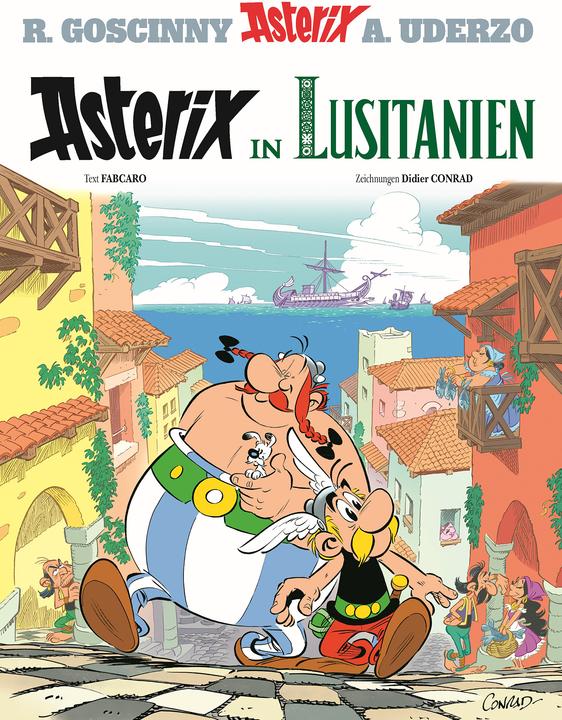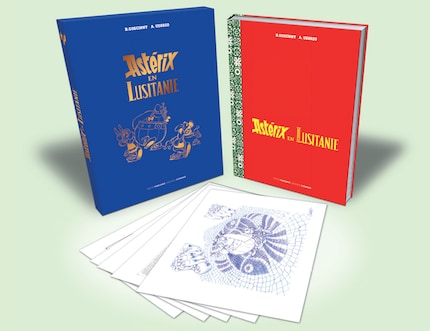

Feature writers lavish praise on the new Asterix volume
A new Asterix volume is only published every two years, but then in a print run of millions. How do reviewers and Asterix connoisseurs rate the new volume with the number 41 "Asterix in Lusitania"?
On the very first day after its publication, many major news portals published detailed reviews of the new Asterix volume.

This is not because the feature writers have worked their way through the 48 pages particularly quickly. Rather, the publisher sent out review copies in advance with the note that no reports revealing anything about the plot may appear before Thursday. The embargo has now been lifted - and I have summarised some of the opinions of feature writers for you here.
«Watson»: Sidekick Obelix becomes a central character
Editor Stefan Strittmatter read the new Asterix book for «Watson» and CH Media. In his review, he is full of praise. «Asterix in Lusitania» is «the best [volume] in 50 years». Back then, in 1975, «Die grosse Überfahrt» was published. Strittmatter emphasises that « the overdrawn action elements of earlier years» have been discarded and instead «the right ingredients» are now being used. The fact that lyricist Fabcaro and cartoonist Didier Conrad have taken one or two hooks in the story «» contributes significantly to the reading pleasure «» . In addition, the sidekick Obelix once again becomes a more central character, as in «Obelix GmbH & Co. KG» or «Obelix auf Kreuzfahrt». The 41st Asterix volume breathes «the spirit of the golden years for the first time in 50 years», he summarises.

Source: Egmont Ehapa
«Time»: Nationality humour out of time
In the «Zeit» editor Raoul Löbbert has reviewed the 41st Asterix volume (here to the article; only with a plan). He is not surprised by the story, as he is familiar with similar ones from Asterix in Spain or Asterix in Switzerland. «But it hasn't been as funny as this one since the days of Goscinny and Uderzo.» For Löbbert, every Portuguese cliché is used and ironically broken. However, the harmless nationality humour does seem a little out of date.
«Spiegel»: Asterix experiences a creative upswing
Editor Arno Francs is an Asterix expert at the news magazine «Spiegel». In his review (here to the article, behind the paywall), he is pleased that the series «is currently experiencing a creative upswing» that one would no longer have expected of the series. Responsible for this, according to Francs: the «sweeping strokes» of Didier Conrad, whose «opulent tableaux are sun-drenched and full of detail, from cod to vegetation, from traditional ceramics to the »calçada portuguesa«, the typical local pavement». Every single picture is recognisably Portuguese. According to the «Spiegel» editor, «Asterix in Lusitania» is the «most text-heavy volume of all time». I don't know if he really counted the words. But for him this is not critical, but a «great stroke of luck». He praises Fabcaro's great joy in running gags («They're crazy, ours»).

Source: Egmont Ehapa
«Redaktionsnetzwerk Deutschland»: Second best tape since «Belgium»
Editor Matthias Halbig has read and reviewed the new Asterix volume for the «Redaktionsnetzwerk Deutschland» (RND). For him, the new adventure «is more or less a business thriller». He praises lyricist Fabcaro in particular. He is «the man de Pointe», which he already proved in his first book «Die weisse Iris». However, he has identified a few weaknesses in the story; the resolution about the wrongly suspected Lusitanian named Schåuprozess comes too quickly for him. Otherwise, everything is there «in the second best volume since «Belgium» - from the Roman beating to the village banquet.»
«World»: Concerns about left-wing Gauls unfounded
In the «world» editor Matthias Heine wonders with concern: «Are Asterix and Obelix on the left now?» Why? Well, because the features editor has noticed that the Gauls are fighting against the excesses of global capitalism in Lusitania in the new volume. However, he immediately gives the all-clear for readers of the «world» who may tend to be more conservative. The editor writes: "As usual, the new Asterix story is characterised by a sceptical, slightly culturally conservative spirit. «Only global entrepreneurs are portrayed negatively here, boasting that they have found people somewhere who work even harder for less money.» On the other hand, the sympathies belonged to medium-sized entrepreneurs such as the Phoenician trader Epidemais or the Lusitanian garum manufacturer Schaõprozes.
What do you think of the new Asterix volume - if you've read it at all? Or have the reviews from the world of feature pages whetted your appetite?
Journalist since 1997. Stopovers in Franconia (or the Franken region), Lake Constance, Obwalden, Nidwalden and Zurich. Father since 2014. Expert in editorial organisation and motivation. Focus on sustainability, home office tools, beautiful things for the home, creative toys and sports equipment.
From the latest iPhone to the return of 80s fashion. The editorial team will help you make sense of it all.
Show all